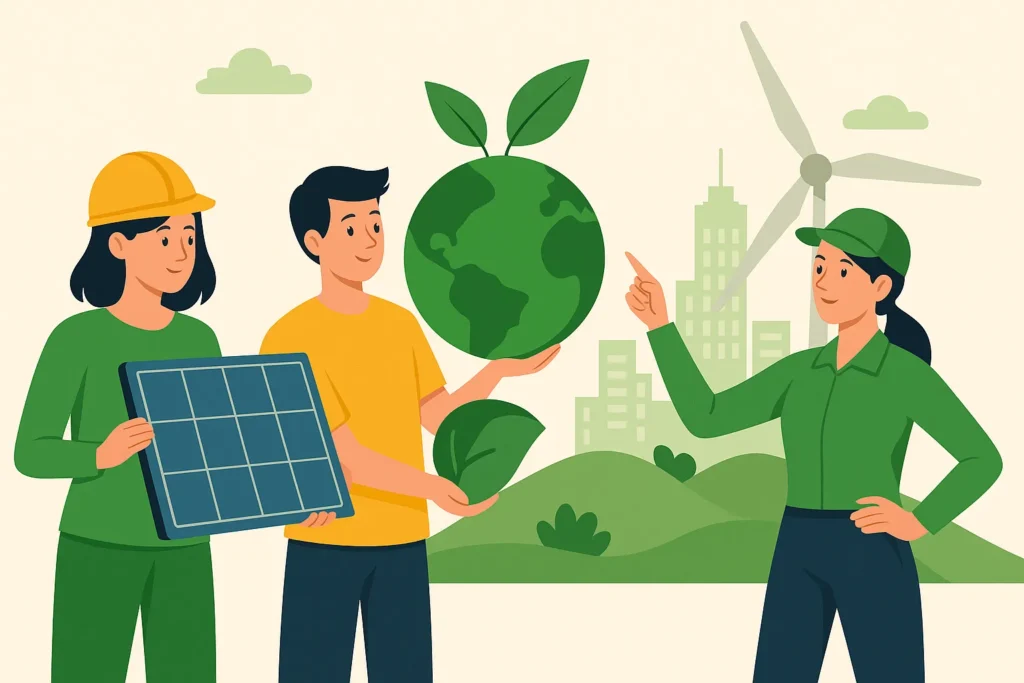Ever wondered what the job market will look like in the next decade? Or maybe you’re curious about how you can align your career with a more sustainable future? Well, you’re in the right place! This article dives into the exciting world of green jobs and future workforce trends, exploring the opportunities and skills you’ll need to thrive in a rapidly changing landscape.
Understanding the Rise of Green Jobs
The term “green job” isn’t just a buzzword. It represents a significant shift in how we work and what we value.
What Exactly are Green Jobs?
Green jobs are positions that contribute directly to environmental sustainability. They aim to protect ecosystems, conserve natural resources, and reduce pollution.
These roles can be found in various sectors, from renewable energy to sustainable agriculture. They are essential for building a greener and more resilient economy.
The Growing Demand for Green Skills
As environmental awareness increases, so does the demand for green skills. Companies across industries are seeking professionals who can implement sustainable practices.
This includes skills in areas like:
- Renewable energy technologies
- Environmental engineering
- Sustainable agriculture
- Waste management
These skills are becoming increasingly valuable in the job market.
Factors Driving the Green Job Market
Several factors are fueling the growth of green jobs. Government regulations, technological advancements, and consumer demand for sustainable products are all playing a role.
Additionally, the increasing awareness of climate change is pushing businesses to adopt more environmentally friendly practices. This, in turn, is creating new job opportunities.
Key Sectors Leading the Green Job Revolution

Green jobs aren’t confined to a single industry. They’re emerging across multiple sectors, each contributing to a more sustainable future.
Renewable Energy: Powering the Future
The renewable energy sector is at the forefront of the green job revolution. It includes jobs related to solar, wind, hydro, and geothermal energy.
From installing solar panels to maintaining wind turbines, these jobs are essential for transitioning away from fossil fuels. The demand for skilled workers in this sector is expected to grow significantly in the coming years.
Sustainable Agriculture: Feeding the World Responsibly
Sustainable agriculture focuses on producing food in a way that minimizes environmental impact. This includes jobs related to organic farming, precision agriculture, and soil conservation.
These roles are crucial for ensuring food security while protecting our planet’s resources. They require a deep understanding of ecological principles and innovative farming techniques.
Environmental Consulting: Guiding Businesses Towards Sustainability
Environmental consultants help businesses assess their environmental impact and develop strategies for reducing it. They provide expertise on issues such as pollution control, waste management, and energy efficiency.
These professionals play a vital role in helping companies become more sustainable and compliant with environmental regulations. Their expertise is highly sought after in today’s business environment.
Waste Management and Recycling: Closing the Loop
Effective waste management and recycling are essential for reducing pollution and conserving resources. This sector includes jobs related to waste collection, recycling processing, and waste-to-energy technologies.
These roles are critical for creating a circular economy where waste is minimized and resources are reused. They require a strong understanding of environmental regulations and waste management practices.
Green Building and Construction: Building a Sustainable Future
Green building and construction focuses on designing and constructing buildings that are energy-efficient and environmentally friendly. This includes jobs related to sustainable design, green building materials, and energy-efficient technologies.
These roles are essential for reducing the environmental impact of the built environment. They require a strong understanding of sustainable building practices and technologies.
Future Workforce Trends in Green Jobs
The green job market is constantly evolving, driven by technological advancements and changing societal priorities. Understanding these trends is crucial for anyone looking to pursue a career in this field.
The Rise of Automation and AI in Green Industries
Automation and artificial intelligence (AI) are transforming many industries, including the green sector. These technologies are being used to improve efficiency, reduce costs, and enhance sustainability.
For example, AI can be used to optimize energy consumption in buildings or to monitor environmental conditions in real-time. While automation may displace some jobs, it will also create new opportunities for workers with skills in AI and data analysis.
The Importance of STEM Skills
Science, technology, engineering, and mathematics (STEM) skills are becoming increasingly important in green jobs. Many of these roles require a strong understanding of scientific principles and technical expertise.
For example, renewable energy engineers need to understand the physics of solar and wind power, while environmental scientists need to be able to analyze environmental data. Investing in STEM education is crucial for preparing the workforce for the green economy.
The Need for Interdisciplinary Skills
In addition to STEM skills, interdisciplinary skills are also highly valued in green jobs. This includes skills in areas such as communication, collaboration, and problem-solving.
Many green jobs require professionals to work across different disciplines and to communicate complex information to a variety of audiences. Developing these skills is essential for success in the green job market.
Upskilling and Reskilling Initiatives
As the green job market evolves, upskilling and reskilling initiatives are becoming increasingly important. These programs provide workers with the skills they need to transition into green jobs.
Governments, businesses, and educational institutions are all investing in upskilling and reskilling programs. These initiatives are crucial for ensuring that the workforce has the skills needed to meet the demands of the green economy.
The Role of Education and Training
Education and training play a critical role in preparing the workforce for green jobs. From vocational training to university degrees, there are many pathways to a career in the green sector.
Educational institutions are increasingly offering programs that focus on sustainability and environmental science. These programs provide students with the knowledge and skills they need to succeed in the green job market.
How to Prepare for a Career in Green Jobs
Interested in pursuing a career in green jobs? Here are some steps you can take to prepare yourself for this exciting and rewarding field.

Identifying Your Interests and Skills
The first step is to identify your interests and skills. What are you passionate about? What are you good at?
Consider your strengths and weaknesses and how they might align with different green job roles. This will help you narrow down your options and focus your efforts.
Gaining Relevant Education and Training
Once you have identified your interests and skills, the next step is to gain relevant education and training. This could involve pursuing a degree in environmental science, engineering, or a related field.
It could also involve taking vocational training courses or participating in online learning programs. Choose a program that aligns with your career goals and provides you with the skills you need to succeed.
Networking and Building Connections
Networking is essential for finding job opportunities in any field, including green jobs. Attend industry events, join professional organizations, and connect with people working in the green sector.
Building relationships with professionals in the field can provide you with valuable insights and opportunities. It can also help you stay up-to-date on the latest trends and developments in the green job market.
Seeking Internships and Volunteer Opportunities
Internships and volunteer opportunities are a great way to gain practical experience and build your resume. Look for opportunities to work with organizations that are focused on sustainability and environmental protection.
These experiences can provide you with valuable skills and knowledge that will make you more competitive in the job market. They can also help you determine if a particular green job role is right for you.
Staying Informed About Industry Trends
The green job market is constantly evolving, so it’s important to stay informed about industry trends. Read industry publications, attend webinars, and follow thought leaders on social media.
Staying up-to-date on the latest developments will help you identify emerging opportunities and prepare for future challenges. It will also demonstrate your commitment to the field and your passion for sustainability.
Overcoming Challenges in the Green Job Market
While the green job market offers many opportunities, it also presents some challenges. Understanding these challenges and how to overcome them is crucial for success.
Skill Gaps and Training Needs
One of the biggest challenges in the green job market is the skill gap. Many employers are struggling to find workers with the skills they need to fill green job roles.
To overcome this challenge, it’s important to invest in education and training. Focus on developing the skills that are in high demand, such as STEM skills and interdisciplinary skills.
Competition for Jobs
The green job market is becoming increasingly competitive as more people become interested in pursuing careers in this field. To stand out from the competition, it’s important to have a strong resume and a clear understanding of your skills and qualifications.
Networking and building connections can also help you gain a competitive edge. Be prepared to demonstrate your passion for sustainability and your commitment to making a difference.
Economic Fluctuations and Policy Changes
The green job market can be affected by economic fluctuations and policy changes. For example, changes in government regulations or funding for renewable energy projects can impact job growth in the green sector.
To navigate these challenges, it’s important to stay informed about industry trends and to be adaptable. Be prepared to adjust your career plans as needed and to seek out new opportunities as they arise.
The Future of Green Jobs: A Sustainable Outlook
The future of green jobs looks bright. As the world becomes more aware of the importance of sustainability, the demand for green skills and expertise will continue to grow.
Long-Term Growth Potential
The long-term growth potential for green jobs is significant. As governments, businesses, and individuals prioritize sustainability, the green sector will continue to expand.
This growth will create new opportunities for workers with skills in areas such as renewable energy, sustainable agriculture, and environmental consulting. Investing in a career in green jobs is a smart choice for the future.
Technological Innovations and New Job Creation
Technological innovations will continue to drive the growth of green jobs. As new technologies emerge, they will create new opportunities for workers with specialized skills.
For example, the development of new battery technologies could create new jobs in the energy storage sector. Staying up-to-date on technological advancements is crucial for identifying these emerging opportunities.
Global Collaboration and International Opportunities
The green job market is becoming increasingly global. As countries around the world work together to address environmental challenges, there will be more opportunities for international collaboration.
This could involve working on international projects, collaborating with researchers from other countries, or pursuing job opportunities abroad. Developing cross-cultural communication skills and a global perspective can be valuable assets in the green job market.
In conclusion, the world of green jobs and future workforce trends is ripe with opportunity. By understanding the key sectors, future trends, and how to prepare, you can position yourself for a rewarding career that contributes to a more sustainable future. The time to act is now – explore your options, gain the necessary skills, and join the green revolution! What are your thoughts on the future of green jobs? Share your insights and experiences in the comments below!

